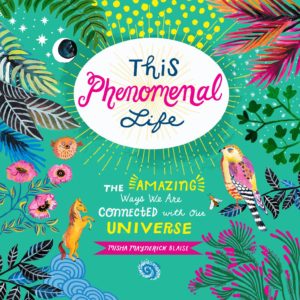#WBReflects by Gayleen Rabakukk
I met Misha Blaise at a recent Wine and Words event at the Writing Barn. She is the author and illustrator of This Phenomenal Life: The Amazing Ways We Are Connected With Our Universe (Lyons Press, 2017). Misha shared her inspiration for writing the book and her fascination with the unseen connections joining mankind, the earth, and the entire universe.
“We’re always interacting with the environment and with other people,” Misha said. She described how we share the same biochemical basis of life with all living beings on earth, and beyond; all biochemical elements originated from the explosion of stars when the universe was born. This concept of interconnectedness appeals to my focus on the things we have in common, rather than the things that separate us. “If you read any mystical writing, like Rumi, you look in any pair of eyes you meet and see the divine,” Misha said. “This idea that we’re seeing this ancient heritage that’s very mysterious and otherworldly.”
Ultimately though, I was even more intrigued by what Misha said about nature and how it affects us. “I came across all this research about how nature psychologically changes you,” she said. “Like even twenty minutes of being in a park or somewhere with a lot of trees can affect your serotonin levels. People feel more positive about life and are less brooding. I think any of us could test this out.”
“My husband and I are in green building (Equitable Green Group). Something we’ve been implementing is the concept of biophilia – basically, bringing the outdoors into your inside spaces as much as possible and then design our spaces in a way that replicates the outdoors.” Misha pointed out the support poles inside the Writing Barn that illustrate its past life of being a tree.
The idea of getting a creative boost from nature comes as no surprise to Writing Barn regulars. When I pass by the iron gate to follow the winding path, shaded by cedar and twisting oaks, I feel like I’ve entered another world. I’ve left the hustle and bustle of MoPac traffic behind, and have been granted access to a part of my mind that’s too often overlooked. The white-tailed deer and her spotted fawns casually nibble prairie grass and wildflowers; they fascinate me. Rabbits and squirrels scamper across the gravel driveway as songbirds chirp nearby. I’ve seen wildlife before, but in this context it’s easy to imagine these creatures are messengers of the Muses, sent specifically to offer inspiration and blessings for my writing journey.
That last paragraph may sound too mystical, but Misha’s comments about biophilia prompted me to do my own research about nature’s relationship to creativity. I’m always looking for anything that will give my writing an extra boost.
I found Florence Williams’ recent book, The Nature Fix: Why Nature Makes Us Happier, Healthier and More Creative (W.W. Norton & Co., 2017). Florence interviewed scientists from across the globe, engaged in research that supports Misha’s assertion that connecting with nature can give us an edge. Some of her conclusions are summarized in a National Geographic article featuring cognitive psychologist David Strayer. His research has shown that people performed 50 percent better on creative problem-solving tests after a three-day backpacking trip. He theorizes that “being in nature allows the prefrontal cortex, the brain’s command center, to dial down and rest, like an overused muscle.”
Most of us don’t have three days to dedicate to immersing ourselves in nature, and fortunately the research shows that it doesn’t take nearly that long. After only five minutes in a natural setting, heart rates slow, facial muscles relax and the brain’s frontal lobe begins to quiet down. These factors have been shown to boost productivity and creativity. Strayer’s work draws on a concept called “attention restoration theory,” introduced by environmental psychologists Stephen and Rachel Kaplan. They say that focusing on the visual elements in nature reduces stress and mental fatigue, allowing our minds to wander, rest, and become more reflective. For writers, the ability to include specific details allows us to connect with readers. The worlds we create become richer, fuller, and more real through precise language; this requires focusing our attention. Interaction with nature appears to be a very effective strategy for increasing our capacity for attention and creativity.
My connection with Misha at the Writing Barn led me to a completely unexpected discovery about how my brain works.
What will you discover at the Writing Barn?
Gayleen Rabakukk holds an MFA in Writing for Children and Young Adults from Vermont College of Fine Arts and an undergraduate degree in journalism. She has published numerous newspaper and magazine articles, and two regional interest books for adults. Now she focuses her energy on inspiring curiosity in young readers through stories of hope and adventure.



